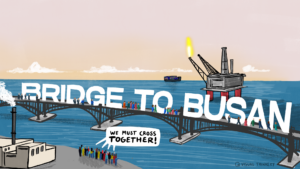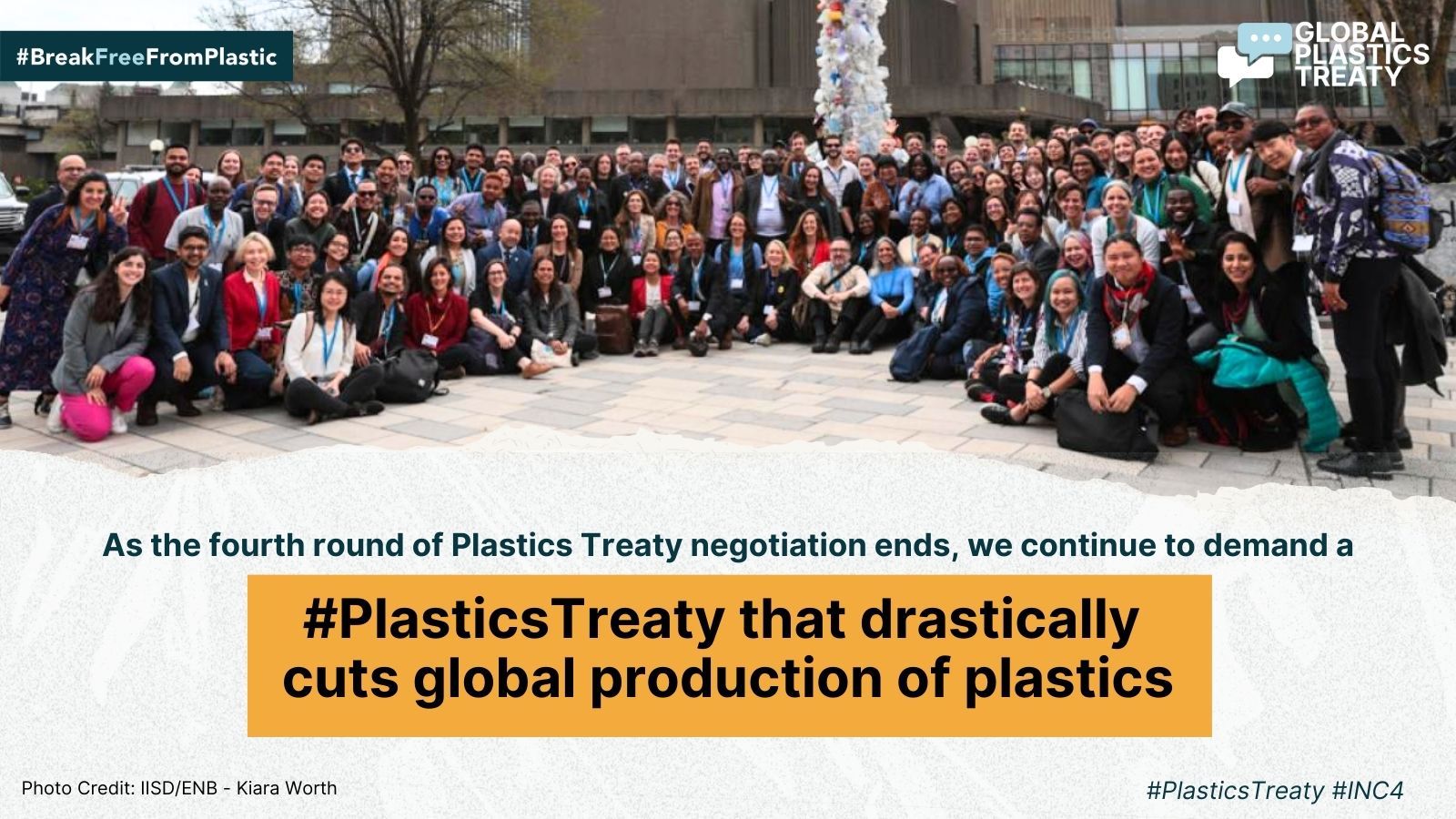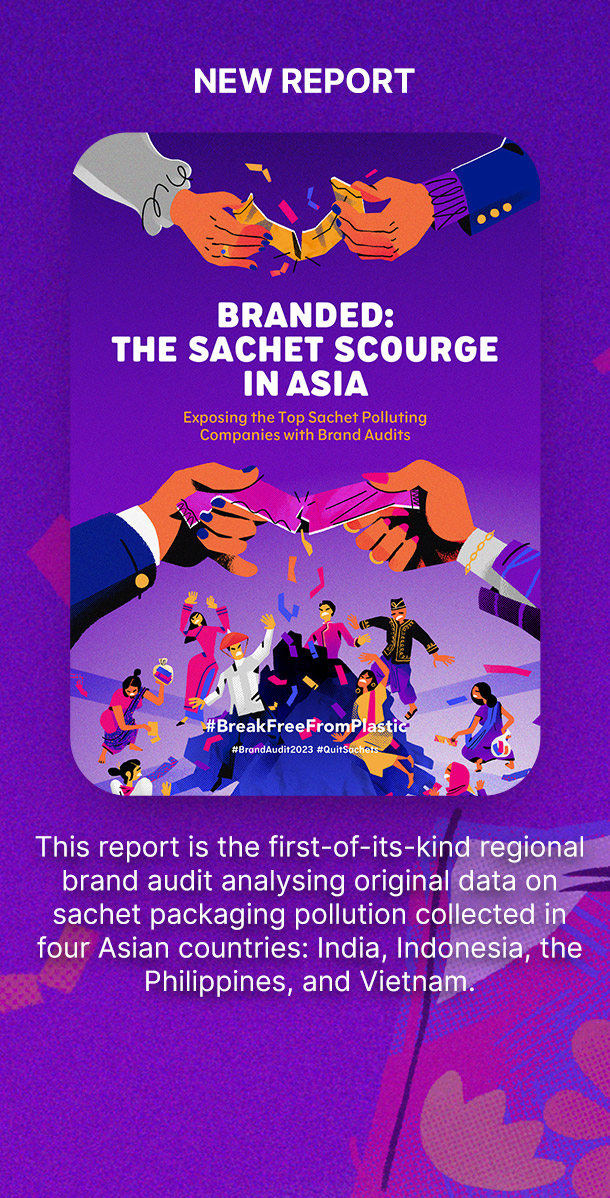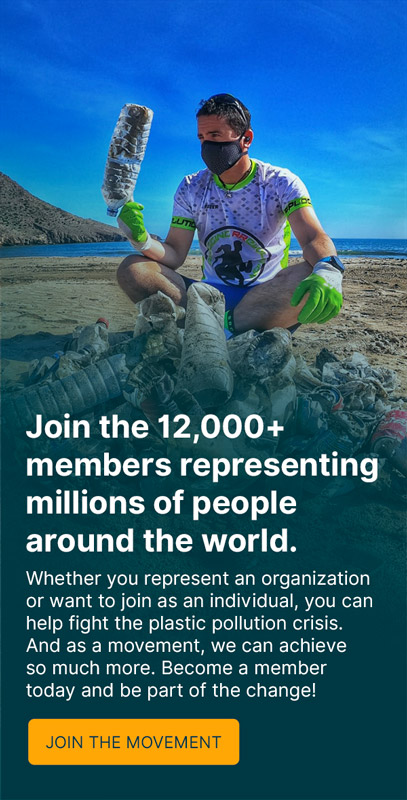Ottawa, Canada | Traditional, unceded territory of the Algonquin Anishinaabeg People – The fourth meeting of the Intergovernmental Negotiating Committee (INC-4) for a global agreement to end plastic pollution concluded after a plenary full of huddles, leaving the most contentious item to the very end of the session: intersessional work, which will not be including discussions on primary plastic polymers.
Countries decided to move forward with intersessional work on the financial mechanism, as well as on plastic products, chemicals of concern in plastic products, product design, reusability, and recyclability. Member States agreed to include observers’ participation during this work. Additionally, they decided to create a legal drafting group that will conduct a legal review of the text and provide recommendations to the plenary.
Today’s decision to exclude upstream measures from the intersessional work means it will be more daunting to include extraction or production reduction measures under the ambit of the draft plastics treaty. This compromise diminishes the ambition of this process as it ignores the central role of plastics production in fueling the climate, biodiversity and pollution crises. This is not only an utter disappointment, but also a missed opportunity to tackle the root causes comprehensively.
The seven days spent in Ottawa in negotiations revealed who are the champions for an ambitious plastics treaty that addresses the full lifecycle of plastics from extraction to disposal, and who are the spoilers bending to the interests of the plastics and fossil fuel industry.
Perú and Rwanda stood out as champions for presenting a proposal for intersessional work on primary plastic polymers with aims to reduce 40% of the global use of primary plastics polymers by 2040 from 2025 levels, which a number of delegations strongly supported, including Malawi, the Philippines, and Fiji.
In addition to the Rwanda/Perú proposal, several countries launched the Bridge to Busan Declaration on Plastic Polymers to rally parties in support of keeping the provision for addressing primary plastic polymers alive in the treaty text and building momentum for the fifth (and last planned) round of negotiations in Busan, Republic of Korea later this year. However, it is a non-legally binding effort with no mention of extraction.
The “spoilers,” on the other side of the spectrum, are a small group of polymer-and-plastics-producing countries, including Saudi Arabia, India, Kuwait, and Qatar, who tried to reopen and sow doubts over the scope of the draft treaty to redefine what the full lifecycle of plastic means, in an apparent bid to reduce the coverage of the proposed treaty to waste management matters only.
Although there was progress on substantial negotiations in Ottawa, countries are walking away with a text that is not yet fit for final negotiations in Busan. While there has been some streamlining of the draft, there have also been more additions than deletions, leading to a text riddled with a large number of options and bracketed words and sentences (i.e language not yet agreed upon). A small number of countries continued their obstructionist and low-ambition tactics—watering down, adding countless brackets, and shamelessly twisting the language across the different provisions in an attempt to narrow the scope and lower the ambitions of the treaty.
Parties have been operating under provisionally applied rules of procedure that allow for voting on decisions if all efforts to reach a consensus have been exhausted. However, under pressure from countries seeking to obstruct progress that insist there can be no voting, countries have been operating under a de facto consensus-based decision-making process, limiting ambition even on decisions related to intersessional work.
The low-ambition efforts are not surprising, given how much fossil fuel interests have been increasing their presence at the negotiations. Early in the week, a CIEL analysis of the UNEP list of INC-4 participants revealed that 196 lobbyists for the fossil fuel and chemical industry registered—which is seven times greater than the Scientists’ Coalition for An Effective Plastic Treaty and seven times greater than the Indigenous Peoples Caucus—representing a 37% increase compared to INC-3 only six months ago.
As countries continue on the path to INC-5, it is imperative that they act on the demands of Indigenous Peoples as rightsholders entitled to a healthy environment. Indigenous Peoples, together with allies in fenceline and frontline communities around the world, have been explicit in their demands for protection from the harms of fossil fuel extraction and of false solutions like incineration and chemical recycling—which is a requirement for defending their right to a healthy environment—as well as in their call for real circular solutions like non-toxic reuse systems and other Indigenous practices. Plastic proliferation and pollution are multifaceted and global issues. All of us rely on countries to continue pursuing legally binding measures within international law to ensure we agree on a treaty by the end of the year that addresses the full life cycle of plastics from extraction to disposal.
Break Free From Plastic members react to the end of the Plastics Treaty INC-4:
Janelle Nahmabin / Elected Councillor, Aamjiwnaang First Nation / Turtle Island (Canada), said:
"Aamjiwnaang left the negotiations feeling supported and heard by our Indigenous relations, and our allies. Indigenous Peoples must be given a seat at the negotiating table. Many of us are advocating for a strong treaty that puts human health above money. That's the world we want, and that's the world we will stand for. We are determined to keep the momentum going."
Frankie Orona / Executive Director, Society of Native Nations / Turtle Island (United States), said:
“Negotiating with the U.S. and other oil states has felt like trying to negotiate with industry, always prioritizing profit over the well-being of people and the planet. In order to have an ambitious Treaty, we need a fundamental shift. We need intersessional work with the inclusion of Indigenous Peoples—who are rights holders with traditional knowledge and a deep understanding of sustainable resource management—as well as frontline and fenceline communities—who, for generations, have borne the brunt of environmental damage from fossil fuels and petrochemical production.
By including these often-marginalized groups, we can move beyond ‘business as usual’ to achieve an ambitious Treaty that protects our environment, respects human rights, and fosters a more equitable and sustainable future for all of us and Mother Earth.”
Larisa de Orbe / Director, Red Mexicana de Acción Ecológica / México, said:
“At this stage of the negotiations of the Plastics Treaty, it is important to ensure that the voices of Latin America and the Caribbean are heard, as our region is directly affected by the consequences of excessive plastic production. Some of these consequences include the problems associated with the export of plastic waste to our countries, which we consider waste colonialism, as well as the false solutions that are imposed in the territories, affecting the lives of communities and intensifying environmental injustice.”
Jacob Kean-Hammerson / Ocean Campaigner, Environmental Investigation Agency / United Kingdom, said:
“The INC has once again failed to ask the most fundamental question to the success of the future treaty: how do we tackle the unsustainable production of plastics? While it is important to discuss the financial aspects, how can we discuss means of implementation without knowing what we are implementing?If we continue to ignore the calls of progressive countries and allow blocker countries to hold the talks, hostage, we will fail to reach our shared ambition of ending plastic pollution.”
Christopher Chin / Founder and Executive Director, COARE / United States, said: "Thousands of Country delegates, scientists, NGO representatives, and First Nation rightsholders traveled to Ottawa, Canada to continue negotiating a treaty to end plastic pollution. However, instead of good-faith engagement and progress, they were met with obstruction and delay tactics by industry-inspired interests and a small handful of Countries with no interest in protecting human or environmental health. While the rest of the world literally suffers from the affront of the lifecycle of plastic, these parties shamelessly and knowingly prevent any meaningful development."
Griffins Ochieng / Executive Director, Center for Environmental Justice and Development / Kenya, said:
“A comprehensive global treaty which tackles chemicals in plastics, including primary plastic polymers, is an impetus towards eradicating plastic pollution. The provisions on plastic chemicals and polymers should be legally binding, as well as adaptive and informed by independent science. In doing so, the global Plastic Treaty creates an opportunity to put global control on toxic chemicals, mitigate the negative impacts of plastic on human health and the environment, reduce the global dispersal of chemicals, and protect vulnerable communities, especially in the Global South."
The INC-5 will be held in Busan, Republic of Korea, from November 25th to December 1st, 2024.
Additional reactions from BFFP members and allies (including additional countries and languages) are available here.

###
Notes to the editor
Photos and videos are available here
Cartoons available here
POPLites Daily INC-4 Summary here (April 23, April 24, April 25, April 26, April 27, April 28)
About BFFP — #BreakFreeFromPlastic is a global movement envisioning a future free from plastic pollution. Since its launch in 2016, more than 2,700 organizations and 11,000 individual supporters from across the world have joined the movement to demand massive reductions in single-use plastics and push for lasting solutions to the plastic pollution crisis. BFFP member organizations and individuals share the values of environmental protection and social justice and work together through a holistic approach to bring about systemic change. This means tackling plastic pollution across the whole plastics value chain – from extraction to disposal – focusing on prevention rather than cure and providing effective solutions. www.breakfreefromplastic.org.
Global Press Contacts:
- Caro Gonzalez | Caro@breakfreefromplastic.org
- news@breakfreefromplastic.org
Regional Press Contacts:
- United States and Canada: Brett Nadrich | Brett@breakfreefromplastic.org
- Africa: Carissa Marnce | Carissa@no-burn.org
- South East Asia: Eah Antonio | Eah@breakfreefromplastic.org
- South Asia: Devayani Khare | devayani@breakfreefromplastic.org
- Europe: Bethany Spendlove Keeley | Bethany@breakfreefromplastic.org
- Latin America: Camila Aguilera | Camila@no-burn.org




